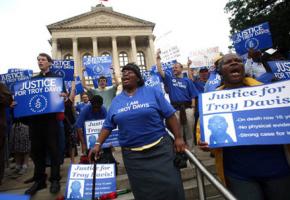The fight continues for Troy Davis
A recent day of action drew out dozens of activists in several cities to call for justice for Troy Davis. rounds up reports from around the country.
AS GEORGIA death row prisoner Troy Davis and his family wait for word from the U.S. Supreme Court on whether his case will be reopened so evidence of his innocence can be heard, activists in several cities turned out September 29 for support rallies.
Though small, the demonstrations--held in Atlanta; San Francisco; Chicago; New York City; Washington, D.C.; Austin, Texas and elsewhere--showed that Troy's case has struck a chord with those who believe authorities are trying to railroad an innocent man to his death.
Davis was convicted in 1989 in the shooting death of Savannah, Ga., police officer Mark MacPhail. There was no physical evidence linking Troy to the crime.
Most importantly, seven of the nine witnesses who claimed at his trial that Troy committed the murder have since recanted their testimony, with several saying that police coerced or threatened them into making false statements. Of the remaining two witnesses, one claims that Troy shot MacPhail with his left hand, despite the fact that Troy is right-handed. The other, Sylvester Coles, was initially a suspect in the murder himself--until he went to the police saying that Troy was the killer. Several people now claim to have heard Coles admit to the murder.

The state of Georgia, however, refuses to hear this evidence. On September 23, the state came within two hours of executing Troy--despite a Supreme Court hearing that had been scheduled for just days later--before the Supreme Court stepped in with an emergency stay of execution.
On September 29, the Supreme Court heard Troy's request for a writ of certiorari--a request to review his case. While the justices were considering the case inside, outside, on the steps of the court building, approximately 30 activists picketed and took turns at the microphone to voice their support for Troy, in a rally organized by Black August Planning and the Nat Turner Rebellion.
In New York City, a group of activists from the Campaign to End the Death Penalty (CEDP), New Yorkers Against the Death Penalty and the Free Mumia Coalition-NYC turned out to Federal Plaza to distribute fact sheets on Troy's case. In Chicago, CEDP members, individuals from DePaul University's chapter of Amnesty International chapter and others came out in the rain to the city's Federal Plaza. In San Francisco and Austin, activists held tablings, passing out fact sheets about Troy's case.
News reports say the Supreme Court could announce its decision in Troy's case as early as October 1 or as late as October 6. If the Court doesn't grant Troy's petition for a writ of certiorari, the state of Georgia will be free to seek a new execution warrant.
If, however, four of the Supreme Court justices agree to Troy's petition, the Court will then examine previous rulings in the case. If the justices then decide that the lower courts acted improperly, the case will be sent back for a new trial or hearing. If, however, the Supreme Court rules that the lower court rulings were legally correct, the way would also be cleared for Georgia to seek a new warrant for Troy's execution.
THE FIGHT to save Troy Davis' life continues, and the impact is being felt, both by Georgia officials--who have become increasingly defensive as the movement to win justice for Troy has gathered steam--and by Troy and his family. As Troy wrote in a statement to his sister and advocate Martina Correia on the night before his scheduled execution:
As I look at my mail from across the globe, from places I have never ever dreamed I would know about, and people speaking languages and expressing cultures and religions I could only hope to one day see firsthand, I am humbled by the emotion that fills my heart with overwhelming, overflowing joy.
I can't even explain the insurgence of emotion I feel when I try to express the strength I draw from you all. It compounds my faith, and it shows me yet again that this is not a case about the death penalty, this is not a case about Troy Davis--this is a case about justice and the human spirit to see justice prevail.
I cannot answer all of your letters, but I do read them all. I cannot see you all, but I can imagine your faces. I cannot hear you speak, but your letters take me to the far reaches of the world. I cannot touch you physically, but I feel your warmth every day I exist...
I have been spiritually free for some time, and no matter what happens in the days and weeks to come, this movement to end the death penalty, to seek true justice, to expose a system that fails to protect the innocent must be accelerated.
There are so many more Troy Davises. This fight to end the death penalty is not won or lost through me, but through our strength to move forward and save every innocent person in captivity around the globe. We need to dismantle this unjust system city by city, state by state, and country by country.
I can't wait to stand with you, no matter if that is in physical or spiritual form--I will one day be announcing: "I AM TROY DAVIS, AND I AM FREE!"


